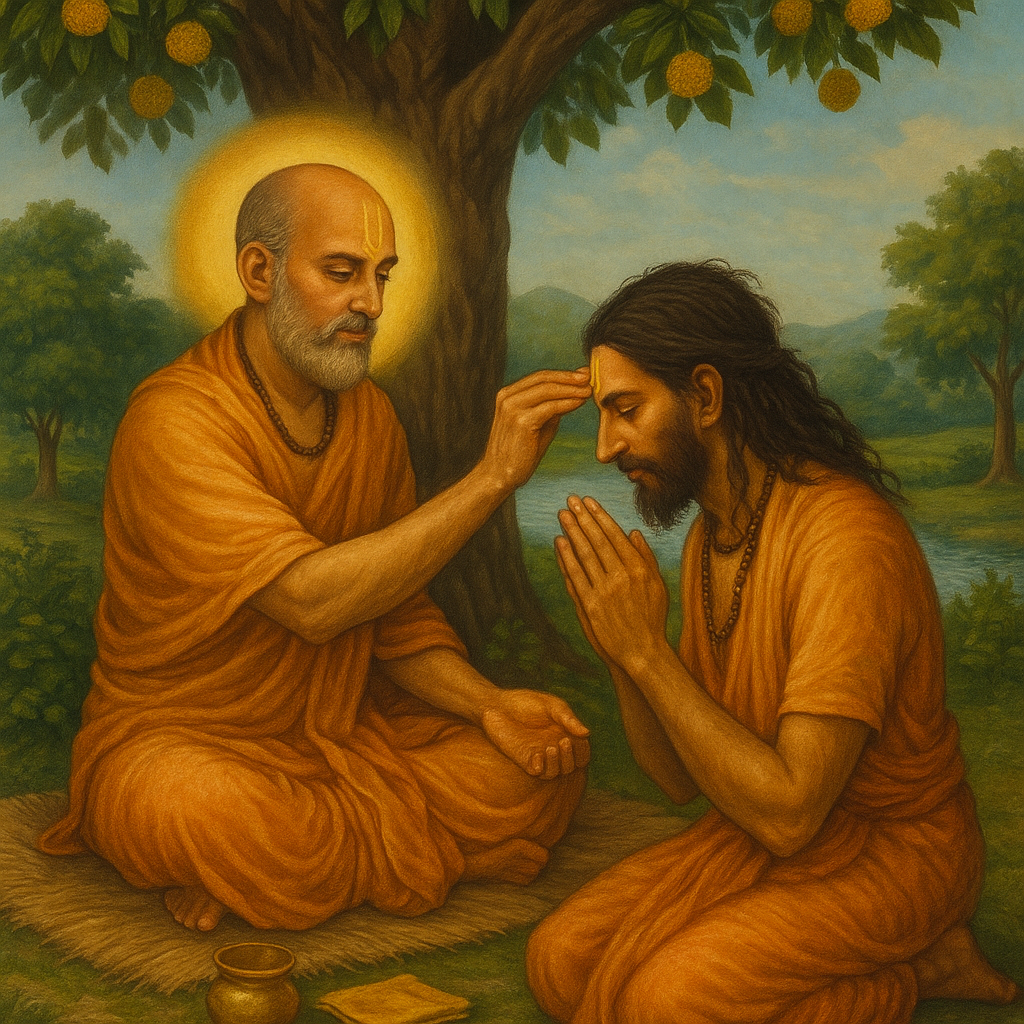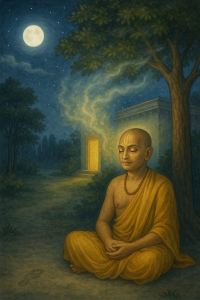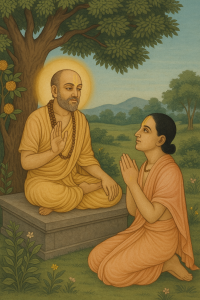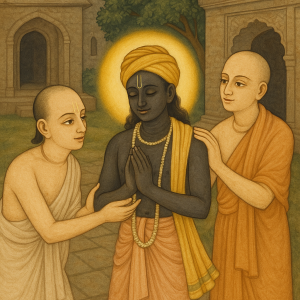(From Śyāmānanda Prakāśa – Chapter 6)
A Prince is Born for Bhakti
In the majestic kingdom of Rohini, ruled by the noble King Acyuta Deva, a divine child was born—a boy of shining form, lotus-like eyes, and a smile that charmed even animals. His parents named him Rasika, for even as a baby, he radiated joy and tenderness.
From a young age, Rasika Deva was different.
- While other children played with toys, he played with śālagrāma-śilās.
- While others mimicked kings, he dressed like a gopāla and sang Kṛṣṇa’s names.
- Instead of royal jewels, he longed for tulasī-mālās.
Though he grew up in a palace, his heart belonged to the forest of Vṛndāvana.
The Dream of the Golden Tilaka
One night, when Rasika was still a young boy, he had a dream. In it, a radiant saint with a golden tilaka—bearing the imprint of Śrī Rādhikā’s foot—appeared to him. The saint, robed in saffron and glowing with divine energy, spoke:
“O Rasika, you are born not for ruling kingdoms, but for ruling hearts. Come find me. Your soul waits to awaken through divine service.”
The dream lingered in Rasika’s heart like a flame. He told no one but burned with the desire to find this saint.
The First Meeting
Word soon reached the court that a great Vaiṣṇava saint named Śyāmānanda Gosvāmī had arrived in the region of Utkala, establishing centers of bhakti and preaching the mood of rādhā-dāsyam.
When Rasika heard this name, his heart leapt.
“It is him! The saint of my dream!”
With permission from his parents, Rasika set out in disguise, dressed as a simple villager, to see this holy man. When he arrived at Śyāmānanda’s āśrama, he saw a saint seated beneath a flowering tree, surrounded by villagers singing:
“Rādhe Rādhe Govinda, bhajo re mana Rādhe Govinda!”
The tilaka on his forehead—the very mark from Rasika’s dream—confirmed it.
Rasika fell at Śyāmānanda’s feet and sobbed:
“O master, I have searched for you across lifetimes. Please accept me as your servant. I am yours.”
Śyāmānanda lifted him gently and gazed deep into his soul:
“You are sent by the Lord. From today, you are my very heart. I shall teach you how to serve the Holy Name and Śrī Rādhā-Kṛṣṇa.”
Initiation into Eternal Service
In a sacred ceremony under a kadamba tree, Śyāmānanda initiated Rasika into the Gauḍīya sampradāya. He gave him the name Rasikānanda, meaning “the blissful servant of divine rasa.”
Śyāmānanda whispered into his ear:
“Always chant the Hare Kṛṣṇa mahāmantra. Worship the feet of Rādhā. Become Her dāsī in heart. Carry Her name in your blood.”
He then applied the divine tilaka to Rasikānanda’s forehead—the same footprint-tilaka that had miraculously reappeared upon Śyāmānanda years earlier.
It glowed like a lamp of eternity.
Rasikānanda was now more than a disciple—he was an extension of his guru’s heart.
The Transformation of a Prince
Back in Rohini, the citizens were stunned to see their prince return:
- Clothed in saffron,
- With matted hair,
- Eyes wet with prema,
- Feet dusty from walking to village after village,
- Mouth overflowing with the name of Rādhā-Govinda.
The boy who was once trained to sit on a throne now slept on straw mats, ate from leaf bowls, and served the poor. He taught farmers, weavers, potters, and dancers to chant the holy name.
He set up kīrtana groups, Vaiṣṇava schools, and prasāda distribution centers. Entire villages turned into sanctuaries of prema.
Rasikānanda’s fame spread like moonlight over the night sea.
The Glory of the Guru
Everywhere Rasikānanda went, he said only one thing:
“All that I have, all that I am, all that I shall become—is from Śyāmānanda Gosvāmī. He planted the seed. I only water it with his blessings.”
He composed songs in honor of his guru. He carried a personal copy of the Śyāmānanda-tilaka clay, and he kept his guru’s sandals on his altar.
Once, a scholar challenged Rasikānanda:
“Why do you praise your guru more than Kṛṣṇa Himself?”
Rasikānanda replied:
“Without the guru, you cannot reach Kṛṣṇa. The guru is Kṛṣṇa’s dearest servant. To water the root is to nourish the whole tree. To serve my guru is to serve God.”
Reflections and Lessons
- Some disciples are born for their guru: Rasikānanda’s whole life was a divine orchestration leading to Śyāmānanda. This is guru-tattva in action—where souls are matched by destiny for divine purpose.
- True royalty is spiritual leadership: Rasikānanda left his palace not for poverty, but for the richness of bhakti, showing that true power lies in transforming hearts, not ruling lands.
- The real tilaka is surrender: The golden tilaka of Śrī Rādhikā was not merely on his forehead, but stamped upon Rasikānanda’s soul.
- A guru’s greatness is seen in his disciple: Just as a tree is known by its fruit, so Śyāmānanda’s glory multiplied through Rasikānanda’s pure service.
- Bhakti is meant to flow outward: Rasikānanda did not sit in caves—he entered cities, fields, and homes, carrying the holy name like a river of nectar.



